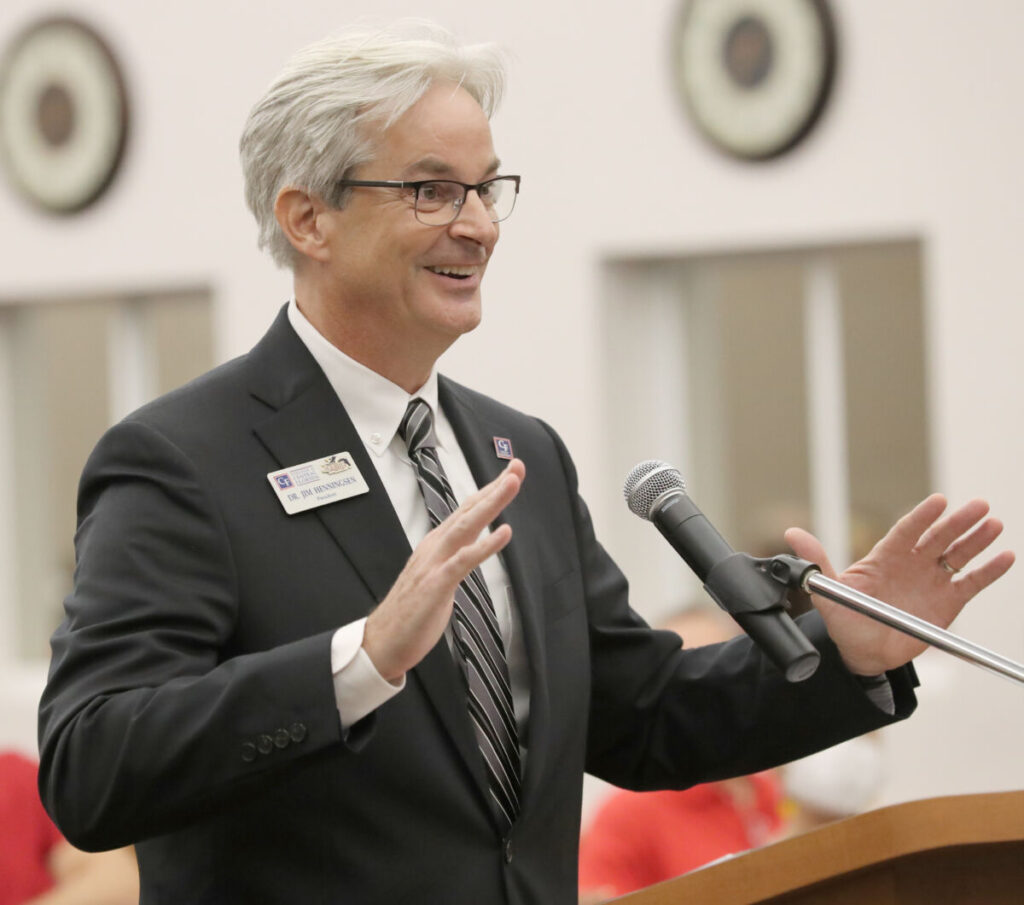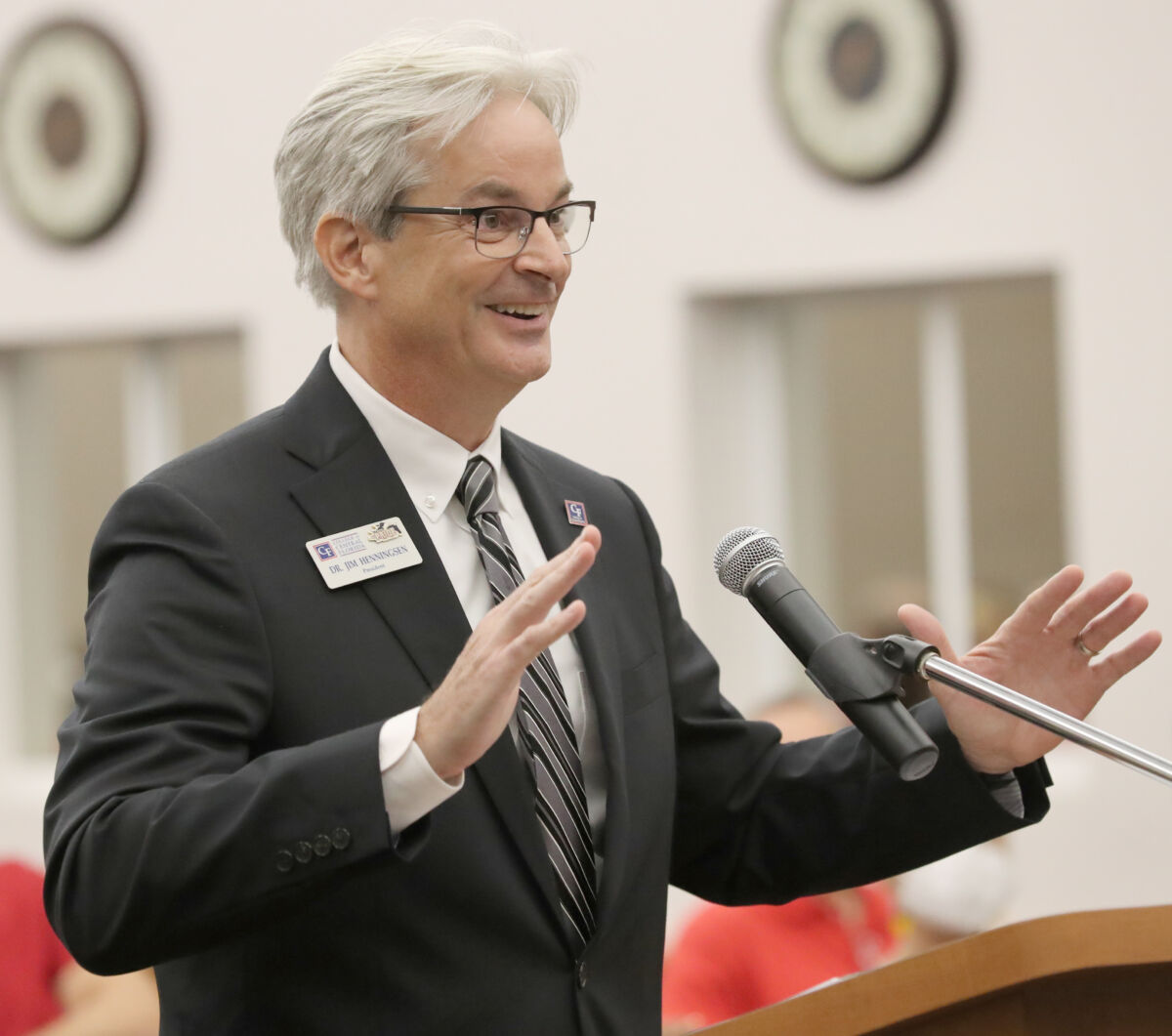CCF gets help with American Rescue Plan

Dr. James Henningsen, the president of the College of Central Florida, speaks to Florida legislators during the Marion County Delegation at the Klein Conference Center at the College of Central Florida in Ocala, Fla. on Thursday, Oct. 7, 2021. [Bruce Ackerman/Ocala Gazette] 2021.

Dr. James Henningsen, the president of the College of Central Florida, speaks to Florida legislators during the Marion County Delegation at the Klein Conference Center at the College of Central Florida in Ocala on Oct. 7. [Bruce Ackerman/Ocala Gazette]
The project, CCF President James Henningsen told the board during the meeting, is expected to cost about $16 million. The school is asking for $13.6 million from the state, and $2 million from both the MCBOCC and the Marion County Hospital District (MCHD).
All the commissioners expressed support for the project but were mindful of ensuring a timetable for completion and an avenue to recoup the funding would exist should the project not be completed before 2026.
ARPA stipulates that all related funds must be spent or returned to the federal government by Dec. 31, 2026, a fact County Administrator Mounir Bouyounes confirmed during the discussion.
As the discussion began, Commission Chair Jeff Gold, who previously worked as an adjunct professor at the college, announced he had terminated all formal association with the college in advance of the vote to avoid the appearance of a conflict.
Gold read a letter he wrote to Henningsen announcing his decision to sever the ties, and then verified with County Attorney Guy Minter that he would be allowed to vote should he need to, which Minter confirmed. After getting the confirmation, Gold voiced his desire to see the college complete the building.
“It is a program that I believe is needed. I think we need to work with our other partners, including the [Marion County] hospital district, and I know that it’s important for them [College of Central Florida] to have both [support from MCBOCC and the MCHD] so that when they go to the state, they will be able to get the additional funding. I will support this, as long as there’s a timeline to show where we’re at and how it’s going,” Gold says.
Commissioner Kathy Bryant also felt all the stakeholders in the project should come together to ensure they are all on the same page when it comes to something she believed will affect “generations to come” in the region.
“I think the most important thing that needs to happen at this time to go ahead and move this project forward would be for the hospital district, this board, and the college to all be in the same room together in a meeting so that everyone understands what’s going on,” Bryant says. “I think it’s very important that if we’re going to commit to this that we need to make sure our other partner is just as committed so that we can push the ball across the line.”
Commissioner Michelle Stone suggested sending MCHD a letter from the board stating their support for the project and requesting the district “make their funding available for the project as it’s been presented to us.”
Commissioner Craig Curry also stated his support for the project, but with a qualifier that the MCBOCC be the final funders.
“I’m gonna vote for it but I think, as I said, we need to be last in. We need to make sure that other entities perform before we just turn the money over,” Curry says.
Marion County Clerk of Court and Comptroller Greg Harrell pointed out they should be mindful of how they designated the funds.
”On this particular item, and anything like it, the board does need to be careful about making sure there is a clear basis as far as which category of ARPA funding entitlement eligibility the decision is based off of,” he says.
ARPA funds have conditions on how the money can be used; it can only be used to support households, small businesses, and non-profits as well as paying essential employees and covering the losses public services incurred. ARPA funds cannot be used to cover the costs associated with cutting taxes or used to delay a raise in taxes.
Frank Mason, a partner with Carr, Riggs, & Ingram, a national CPA and consulting firm working with the county on the issue, approached the board and said he believed there were two ARPA categories the project would qualify for.
Mason noted the project could be classified as either a healthcare response to COVID-19, or it could also be eligible because it adds employment opportunities that would create a stronger workforce to combat the downturn in the economic system.
“Timing is pivotal,” Henningsen says. “The state decisions for capital projects, those decisions were last month, and they’re still waiting to hear back ‘do we or don’t we have a local match on this project.’”.
Not only is the timing important, but the local funding is as well according to Henningsen.
“Ask any of our legislative delegation members, if you don’t have a local match—a guaranteed local match—on your project, they’re not going to fund it,” Henningsen states.
“That’s [local funding] what got us to #2 on the priority list this year. Of all the projects in the Florida college system, across 28 colleges, we’re #2 in priority because of the local match. Now if I don’t have a local match, that can be a problem and they may not fund it this year.”
Additionally, Henningsen pointed out the more local match funding the school secured the less the state needed to contribute.
Should CCF secure funds from both MCBOCC and the MCHD, the amount the state would need to provide would drop. Rather than asking the state for $13.6 million, Henningsen said they would only need to ask the state for closer to $11 million.
After the discussion, the board directed Bouyounes to send the MCHD a letter because of the shortened timeline but left open the possibility of having a joint workshop with the district in the future.





